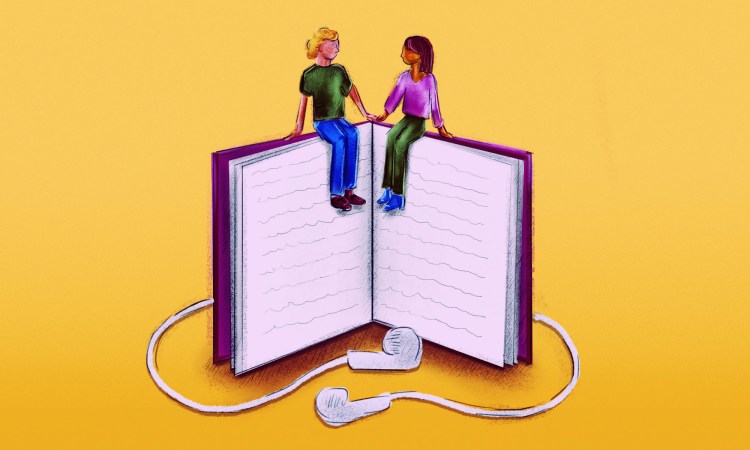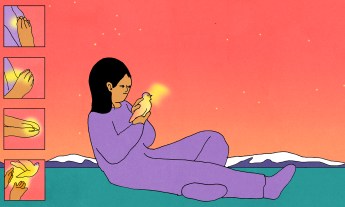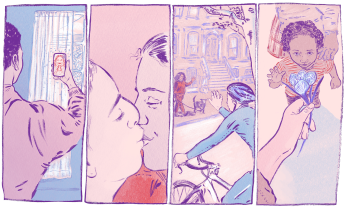
Relationships take work, but there’s good news: Researchers, writers and podcasters have already done some of the heavy lifting in exploring how we can connect with the people in our lives. Marriage and family researcher Carol Bruess shares a list of her favorite relationship books and podcasts.
It may or may not be true that one of my go-to gifts to newlyweds used to be the book What Predicts Divorce. I mean: If you’re going to be in a successful, til-death-do-us type of relationship, you should want to know the science of divorce, amiright?
In my defense, with it I also included a gift card or cash and a note suggesting they use the money to head to their favorite café, bar or restaurant for a date night where they could discuss divorce — just so they don’t end up as one. Good luck!
OK, I didn’t actually write “good luck.” It’s too snarky. Plus, I don’t think relationships are about luck; they’re work.
As a social scientist who studies marriage, family and friendship, I’m of the mind that we should arm ourselves with knowledge about how to make our relationships — all of them, no matter if they’re of the chosen or biological variety — awesome. One thing that we researchers know for sure: Relationships are a little bit art and a little bit science. You increase your chances of success by knowing more about your choices and how they contribute (or don’t) to a healthy partnership.
To help inform you, I’ve picked my favorite books and podcasts for making and keeping better relationships. Some have been my favorites a while; others are newer because they’re newer in publication date or they finally came across my radar (usually thanks to a geeky friend/therapist/fellow relationship researcher).
6 relationship books that I like
The Relationship Cure: A 5 Step Guide to Strengthening Your Marriage, Family, and Friendships by John Gottman and Joan DeClaire
Any book by the relationship guru John Gottman is a book you’ll want to read. (Editor’s note: Watch his TEDxVeniceBeach Talk here.) His longitudinal research on marriage is the gold standard; he and his team can predict divorce with over 90 percent accuracy based on just a few key communication behaviors. In this book, he’s applied those observations — in practical, smart, easy-to-apply lessons — to help all of your relationships. It’s one of my all-time favorites. Never loan your copy to someone; you won’t get it back.
The Seven Principles for Making Marriage Work: A Practical Guide from the Country’s Foremost Relationship Expert by John Gottman
See the above comments about Gottman and his landmark work, and copy/paste here. Then buy a case of these books and gift to everyone you know — keeping one for yourself and one for your spouse/future spouse/significant other and maybe a spare in your bag for those “my head is about to explode because they forgot to _____again” moments. You won’t find more credible advice about how to shift, often just slightly, your tone of voice, word choices or even facial expressions to make your marriage those among the masters (and not the disasters).
If You’re in My Office, It’s Already Too Late: A Divorce Lawyer’s Guide to Staying Together by James Sexton
You might wonder why I, a relationship researcher, am promoting the advice of a divorce lawyer? Here’s what I like and why I highly recommend this book: Sexton reverse-engineers marriage success. He’s seen the worst of the worst (the unthinkable worst and then some) of over a thousand couples. And after being on the front lines of those marriage disasters, he’s able to capture exactly what the relationship researchers are suggesting, with his sharp writing, hard-hitting advice and heart-warming clarity. And he does so in a way that I think will resonate with a lot of people in a way that we — ugh, it’s hard to admit — researchers and professor-types sometimes don’t. As such, I give this book my stamp of approval.
Tiny Beautiful Things: Advice on Love and Life from Dear Sugar by Cheryl Strayed
Radical empathy, that’s Strayed’s game. Packed into this little volume are not just her responses to readers’ letters, but a potent light shone on our greatest human potential in relationship to each other, as she shows how there are opportunities to heal the greatest of injuries in and through our complex entanglements with others. This little book is so powerful I keep it at my bedside table, reaching over and over for a serving of Sugar. In her responses to readers’ letters, she excavates readers’ truths, offering a soul-shifting dose of understanding. As The New Yorker critic Sasha Frere-Jones observed, “Sugar doesn’t coddle her readers — she believes them, and hears the stories inside the story they think they want to tell.” Yes, she is profane at times. But even if that’s not your thing, you will emerge from this book with a more profound relationship to yourself — and thus others. You and your relationships will be more beautiful, in the tiniest and biggest of ways. (Editor’s note: Watch Strayed’s TEDxConcordiaUPortland Talk on Radical sincerity).
What Shamu Taught me about Life, Love, Marriage: Lessons for People from Animals and Their Trainers by Amy Sutherland
Trust me, it will change not only your current and/or future marriage, but every encounter with every other human being in every context — as in forever more. It’s absolutely brilliant and practical. And so obviously simple that it’s a once-in-a-lifetime kind of eye-opener about our own and others’ behavior. It’s also a book you can read in a couple of hours, although I like to re-read the chapters and refine my thinking and techniques. (Oh, and please don’t tell your kids or husband about the book yet, so you can secretly “shamu” them in your experiments for a year or so before giving each of them a copy.)
I Only Say This Because I Love You: Talking to your Parent, Partners, Kids and Sibs When You’re all Adults by Deborah Tannen
This is one of my all-time favorites. Tannen is a Georgetown University professor of sociolinguistics, and she’s been able to — with her witty writing and profound examples — explain exactly how it’s almost always how we say something, not what we say, that will make or break our relationships. It’s possible you’ll garner the concern of everyone around you while reading: Most of us nod like bobble-heads as we consume her examples and explanations. Here is the perfect companion piece to Gottman’s books.
4 podcasts I like
Maybe you’re not an avid reader? I’ve got you covered, and so does the world of podcasting. If you want better, wiser and/or more delightful relationships of many varieties, you’d be wise to stream these relationship-enhancing podcasts.
Where Should We Begin?, hosted by Esther Perel
Wow. WOW. Wowwowowo. Someone said it better than I ever could: “This podcast is free therapy.” Yes, Perel is a brilliant couples therapist. And yes, she essentially — in funny, heartwarming, powerful and heart-opening ways — invites us into her therapy sessions to, in her words, “learn, explore, and experience alongside the couples who have been gracious enough to let us in.” I guarantee that if you listen to Where Should We Begin?, you’ll learn something and/or think about your own intimacy and relationship in a new way. (Editor’s note: Perel is a TED favorite — you can watch her talks here or read her pieces here.)
Dear Sugars, hosted by Cheryl Strayed and Steve Almond
No one does radical empathy about life and relationships better than Strayed. Together with Steve Almond and growing out of their advice column, the Dear Sugars podcast brings to your ears and heart their fundamental and formidable logic, their way of making raw sense of human emotion, and our often nonsensical, illogical, complex relationship experiences. You’ll love their podcast, and learn from it. If you’re anything like me, their advice will seep into your consciousness, often when you least expect it.
Modern Love, based on the New York Times column
Of course, this is one of my faves, and I’ll be surprised if it isn’t one of yours soon too. These are “stories of love, loss and redemption,” and while hosts Meghna Chakrabarti and Daniel Jones don’t know it yet, I consider them friends. Because they’re with me as I fold laundry, drive between the two states I currently call homes, and even bathe. With episodes like “Single Woman Seeking Manwich,” “When Mothers Bully Back” and “GPS For my Lost Identity”, who wouldn’t want to listen?
Bonus: A few months ago Modern Love also became a TV miniseries (thank you, AmazonPrime). I’m not a binge watcher of pretty much anything — until now. Thankfully, given my line of work, I considered my watching this an obligation. And if you need more motivation, you’ll drool over the star-studded cast, among them Tina Fey, Anne Hathaway, John Slattery and Dev Patel.
Hidden Brain, hosted by Shankar Vedantam
Yes, this is a less obvious choice. But holy moly, I cannot stop listening to it; I once listened to more than a dozen episodes back-to-back on an overseas flight. The intersection of neuroscience and social science is not only absolutely fascinating, I also find that every episode teaches me something — if not immediately obvious — about human connection. This is a podcast using a combination of, as the producers put it, “science and storytelling to reveal the unconscious patterns that drive human behavior, shape our choices and direct our relationships.”
Another bonus recommendation: the documentary I Do?
Some of us are neither podcast lovers nor book lovers, and I’m here for you too. How about an award-winning, lighthearted film about the “crazy concept” of marriage? The 2017 documentary I Do? is both fascinating and insightful. It has no easy answers and no stock advice; it’s just an intimate look at the question “when we say ‘I do’, what exactly do we say ‘yes’ to?” My advice to you and yours: No matter if you’re newly engaged or you’ve been married 58 years, watch this doc together and talk about what marriage and commitment and the long-haul means — and doesn’t mean — to you. I guarantee you’ll have a lot to talk about. That’s really the goal, because research shows that when couples even watch a fictional movie about relationship dynamics and then discuss it, it has positive benefits for their own relationship.
Watch her TEDxMinneapolis Salon talk now:











